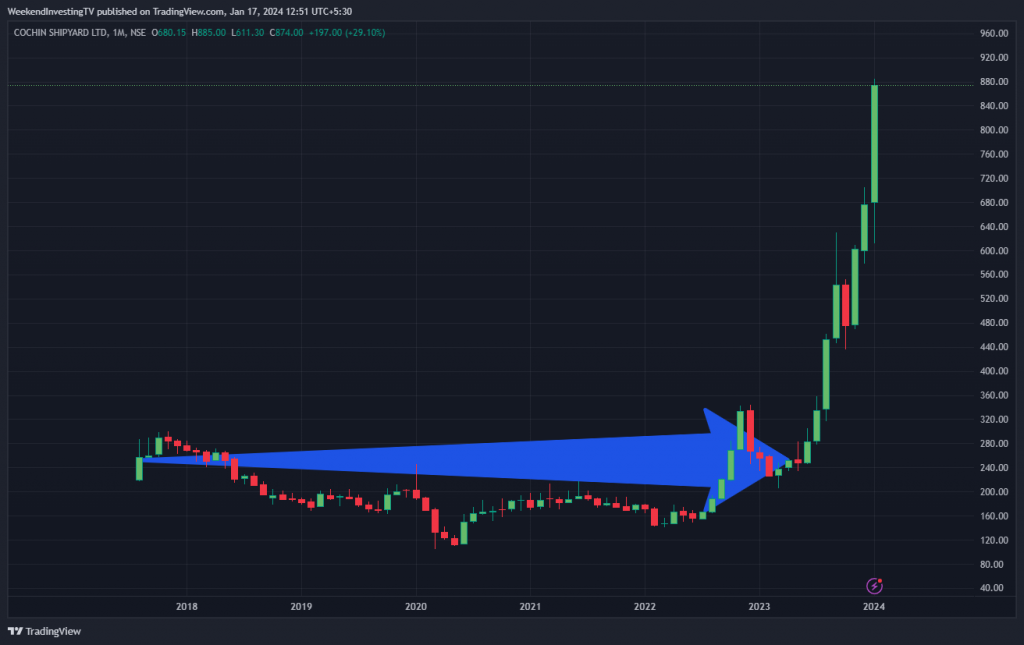As an investor, it is crucial to have a clear plan and strategy when it comes to buying and selling stocks. Without a well-defined approach, emotional imbalances can occur, leading to poor decision-making and missed opportunities for financial growth. To highlight the significance of having a plan, let’s analyse a specific case involving the stock of a Cochin Shipyard.
For the past six years, the stock of the coaching shipyard has been languishing at a price range of around Rs200 to Rs240. Many investors who purchased this stock in 2017 or later witnessed a significant erosion of their net worth, with their investments plummeting by 50% or more. However, the stock eventually started to recover, experiencing a sharp rally that surpassed its previous all-time high.

At this point, most investors who purchased the stock between Rs200 and Rs240 would have likely exited their positions when the stock reached a 52-week high. Some momentum players may have even re-entered their positions during a subsequent price increase, only to find themselves caught on the wrong foot and forced to exit again. This cycle of buying and exiting due to emotional responses can lead to frustrating losses and missed opportunities for profit.
However, it is important not to hold biases against a stock simply because it has stopped you out earlier. There are instances where investors may buy the same stock multiple times, incurring small losses each time. But ultimately, the fourth time could result in exceptional gains, such as a double-bagger return.
This example demonstrates the emotional turmoil that can arise when investors do not have a clear plan in place. Making investment decisions based on discretionary judgement can lead to self-doubt and constant questioning. By removing emotional biases and having a well-defined strategy, investors can reduce the pressure they place on themselves and make more calculated decisions.
Consider the two scenarios:
1. The investor who patiently sat on their investment in the coaching shipyard stock for six years, possibly not making any significant gains but avoiding any substantial losses.
2. The investor who entered the market, incurred a small loss, and then re-entered their position at a more opportune time, resulting in a substantial return within a year or a year and a half.
The second scenario highlights a more efficient and opportunistic use of capital. This investor was able to minimise their losses, make better use of their resources, and avoid prolonged pain and frustration. Investing is not just about making money; it is also about maintaining a positive and enjoyable journey.
Many people fail to realise that avoiding pain is equivalent to experiencing joy. If you are constantly worried, doubtful, and negative about your investment portfolio, it will eventually take a toll on your overall investing journey. Such negativity can hinder your ability to recognize opportunities and capitalise on them, leading to missed chances for success and financial growth.
Furthermore, when the time comes to add more investments or increase your portfolio, many individuals find themselves pulling out instead. This ironic behavior occurs because they have not enjoyed their investing journey, leading to a lack of confidence in their abilities.
To navigate the stock market successfully, it is crucial to establish a clear investment plan. A well-defined strategy helps remove emotional biases and makes investing a more enjoyable and positive experience. Here are some key reasons why having a clear investment plan is vital:
Emotional decision-making often leads to poor investment choices. By having a plan, you can avoid making impulsive decisions based on fear or greed.
With a clear investment plan, you have a framework to guide your decisions. This removes the need for constant self-questioning and doubt, instilling more confidence in your actions.
A clear plan enables you to use your available capital more efficiently and opportunistically. By making calculated investment decisions, you can maximise your returns and minimise losses.
Investing without a plan can be emotionally draining, causing you to sulk about your portfolio and investments. By having a well-defined strategy, you can reduce frustration and enjoy your investment journey.

If you have any questions, please write to support@weekendinvesting.com









